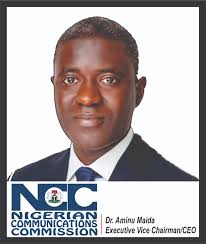The Executive Vice Chairman of the Nigerian Communications Commission (NCC), Dr. Aminu Maida will chair the SUPERNEWS Nigeria SMEs confab scheduled for June 13, 2024 at Radisson Hotel, GRA, Ikeja, Lagos at 10am prompt.
According to a statement signed by the Publisher of SUPERNEWS Nigeria, Ngozi Onyeakusi, the choice of Aminu Maida as Chairman was borne out of the Commission’s commitment in ensuring strong and credible regulatory framework that will engender a positive outcome in the financial inclusion policy of the Federal Government, given that financial inclusion holds a great potential for the Nigerian economy and for the financial stability of the country.
Maida holds an MEng in Information Systems Engineering from Imperial College, London in 2002, and in 2006, he bagged a PhD in Electrical & Electronic Engineering from the University of Bath, United Kingdom.
Between 2018 and 2019, Maida completed a Post Graduate Diploma in Entrepreneurship (FinTech Pathway) program at the Cambridge Judge Business School, University of Cambridge, United Kingdom.
The conference will be bringing together regulators, key stakeholders in the financial services, ICT sectors, small business owners among others.
Dr. Biodun Adedipe, Founder and Chief Consultant of B. Adedipe & Associates Limited will deliver the keynote speech on the theme ‘ Bringing SMEs into the Financial Services Network via Fintech’ while the Director General of the Small and Medium Enterprises Development Agency of Nigeria (SMEDAN) will declare the epoch-making event
Fitch says foreign investigationl inflow depends on forex reforms, not improved oil production.
Fitch Ratings has stated that the ongoing foreign exchange (FX) reforms are necessary to boost foreign direct investment (FDI) and foreign portfolio investment (FPI).
In a presentation on Monday, Gaimin Nonyane, Director of Sovereigns at Fitch, it was stated that Nigeria’s current account (CA) will be strengthened by increase oil refining capacity, but the reforms are still very crucial in attracting foreign investments.
The presentation document noted: “oil recovery and improving oil refining capacity to support C/A, but FDI and portfolio flows depend on FX reform.”
Fitch also highlights the substantial fiscal and monetary reforms Nigeria has undertaken over the past year to stabilize the macroeconomic environment and enhance policy coherence and credibility.
Despite these reforms, Nigeria faces significant challenges in managing its debt. Fitch highlighted that pressure on interest-to-revenue ratios remains high at 38%, driven by higher interest rates and structurally low revenue-to-GDP ratios.
The rating agency also projected a decline in Nigeria’s debt costs, although they are expected to remain significantly high.
To mitigate rising debt costs, Nigeria has implemented measures, such as securitization of Central Bank overdraft, reduction in Central Bank financing, as well as revenue mobilization and tax reforms.
Fitch projects that these efforts will lead to a decline in the interest-to-revenue ratio, averaging 34% in 2024-2025.
However, this ratio will remain one of the highest among ‘B’ rated sovereigns, indicating persistent fiscal challenges.
